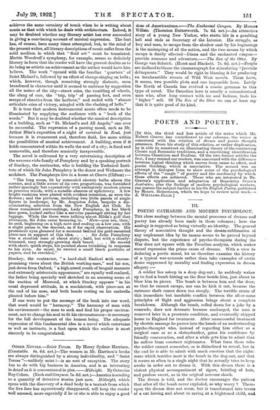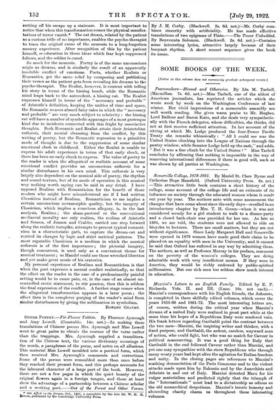POETS AND POETRY.
[IrT this, the third and last article of the series which Mr. Robert Graves has contributed to our columns, the writer is concerned with the relation of dream and poetic thought processes. From his study of this relation, or rather duplication, he is able to construct an illuminating theory of the contrasting Classic and Romantic traditions, and a convincing identification between Classicism and Realism. Of the two former articles the first, I may remind our readers, was concerned with the difference between logical thinking which moves from cause to effect, and poetic thinking, which is associative. The second was an attempt in dialogue form to show some of the psychological effects of the " magic " of poetry and the machinery by which these effects are achieved. Those who are interested in Mr. Graves's application and adaptation of Benedetto Croce's Aesthetics, plus the findings of modern psychological workers, can pursue the subject further in his On English Poetry, published by Messrs. Heinemann, which we hope to review next week.— A. Wrri-JAms-Er.m.s.]
IiL
POETIC CATHARSIS AND MODERN PSYCHOLOGY.
THE close analogy between the mental processes of dreams and poetry has already been made in these columns ; here the analogy is suggested as being virtually an identity. The general theory of associative thought and the dream-sublimation of any unpleasant idea by its means seems to be proved beyond dispute, but the experience of psycho-therapists during the War does not square with the Freudian analysis, which makes sexual repression the prime cause of dreams. With a view to deducing a poetic moral, let us therefore examine the history of a typical war-neurosis rather than take examples of erotic desire suppressed by morality and finding expression in dream allegory :- A soldier lies asleep in a deep dug-out ; he suddenly wakes up to find a bomb hissing on the floor beside him, just about to blow him to pieces. The bomb is between him and the door, so that he cannot escape, nor can he kick it out, because the entrance shaft comes down too steeply. The terrible strain of this immediate but insoluble conflict between the all-or-none principles of flight and aggression brings about a complete breakdown. Although the bomb, rolled down for a joke by a, comrade, does not detonate because uncharged, the man is removed later in a prostrate condition, and eventually shipped home to England for treatment. After unsuccessful treatment by electric massage he passes into the hands of an understanding psycho-therapist who, instead of regarding him either as a surgical case or as a skrimshanker, gains his confidence by friendly conversation, and after a while gets him to admit that he suffers from constant nightmares. What form these take the soldier cannot remember, or is disinclined to reveal, but in the end he is able to admit with much emotion that the night- mare which terrifies most is the bomb in the dug-out, and that it recurs so often in a single night that he actually tries to keep awake in order not to dream it. With this dream there is a violent physical accompaniment of rigors, bristling of hair, and profuse sweat, as in the original nervous shock.
The dream is told, and the doctor encourages the patient that after all the bomb never exploded, so why worry ? There- upon the dream does not recur, but is transformed into terms of a cat hissing and about to spring at a frightened child. and cutting off his escape up a staircase. It is most important to notice that when this transformation comes the physical manifes- tations of terror vanish.* The cat dream, related by the patient as a curious trifle of no importance, enables the psycho-therapist to trace the original cause of the neurosis to a long-forgotten nursery experience. After recognition of this by the patient himself, re-education in those ideas which fear kept suppressed follows, and the soldier is cured.
So much for the neurosis. Poetry is of the same unconscious origin as dreams, and is similarly the result of an apparently insoluble conflict of emotions. Poets, whether Realists or Romantics, get the same relief by composing and publishing their verses as the patient gets from revealing his dreams to the psycho-therapist. The Realist, however, is content with telling his story in terms of the hissing bomb, while the Romantic mind leaps back to the antecedent, a hissing cat. The Realist expresses himself in terms of the " necessary and probable " of Aristotle's definition, keeping the unities of time and space, the Romantic weaves absurd fairy-tales in which the " necessary and probable " are very much subject to relativity ; the hissing cat will have a number of symbolic appanages of a most grotesque kind due to incidents connected with this fright by associative thoughts. Both Romantic and Realist attain their Aristotelian catharsis, their mental cleansing from the conflict, by this writing of poetry, but the Romantic regression to a primitive mode of thought is due to the suppression of some similar emotional clash in childhood. Either the Realist is unable to express his adult experience in terms of that early shock, or there has been no early shock to express. The value of poetry to the reader is when the allegorical or realistic account of some emotional conflict provides an unconscious catharsis for a similar disturbance in his own mind. This catharsis is very largely also dependent on the musical side of poetry, the rhythm and sound-texture, but of its mode of operation in this musical way nothing worth saying can be said in any detail. I have opposed Realism with Romanticism for the benefit of those readers who might have misunderstood me if I had written Classicism instead of Realism. Romanticism to me implies a certain unconscious metamorphic quality, but the imagery of Classicism, which implies a conscious allegory, is, in the last analysis, Realism ; the sham-pastoral or the conventional mediaeval morality are only realism, the realism of Aristotle and Seneca, of Jonson and Crabbe, carried one step forward along the realistic turnpike, attempts to present typical romanti- cism in a characteristic garb, to capture the dream-cat and control its changes by logic and strict metrical patterns. The most reputable Classicism is a medium in which the musical catharsis is of the first importance ; the pictorial imagery, though concurrent, is used only as a convenient theme for musical treatment ; so Handel could use those wretched librettos and yet make great music of his oratorios.
My personal experience of Realism and Romanticism is that when the poet expresses a mental conflict realistically, so that the effect on the reader in the case of a predominantly painful setting would bo to cause pain, or, in the case of an almost un- controlled erotic statement, to stir passion, then this is seldom the final expression of the conflict. A further stage comes when the allegorical transformation appears in a later poem ; the effect then is the completer purging of the reader's mind from similar disturbances by giving the sublimation in symbolism.
ROBERT GRAVES.



































 Previous page
Previous page